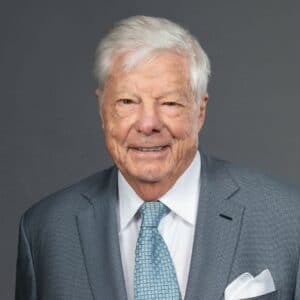Jerry Rappaport, one of the most consequential real estate developers in Boston’s post-war history, has died at age 94.
The Boston Globe first reported Rappaport’s death, saying he passed away at his home in Lincoln.
Rappaport was equally well-known for his real estate achievements as his contributions to building emerging leaders and major institutions of civic life in Greater Boston.
“Jerry Rappaport was a giant in civic leadership, business and philanthropy. As a developer, he was a visionary who played a major role in building the Boston we all know and love today. As a philanthropist and civic leader, he embodied generosity, compassion and humility. Through the Rappaport Foundation, Jerry and his wife Phyllis have been deeply committed to nurturing the next generation of civic leaders, medical researchers, and contemporary artists. His impact will continue to resonate for generations to come,” Rappaport Foundation executive director Tim Medlock said in a statement.
As a developer, Rappaport teamed up with Connecticut and New York City developer Pete Bonan and Theodore Shoolman, a local Realtor, to bid for the rights to redevelop Boston’s West End, wining the contest in 1956 five years after graduating from Harvard Law School. The first phase of the Victor Gruen-designed complex was one of the first major “urban renewal” projects launched by city officials in the wake of World War II, and a bid to help reverse the city’s economic fortunes, which began fading even before the Great Depression two decades before.
The project later became controversial for replacing a working-class, immigrant-heavy neighborhood with a largely market-rate complex, but has also been credited with showing investors and real estate interests that the city could be a profitable destination for investment capital, at a time when much of the industry’s interest was focused on the region’s rapidly growing suburbs thanks to anti-urban federal policy. The project was also credited with attracting middle- and upper-income residents to the city at a time when they, too, were leaving for the suburbs.
“He was a challenging figure,” said Sebastian Belfanti, director of the West End Museum which chronicles the neighborhood’s history. “He was a good landlord for the people he accommodated, but there were supposed to be priority apartments for displaced West Enders that he actively avoided implementing.”
While the Charles River Park development remained his most notable project, he went on to invest in Greater Boston, Florida, Virginia and elsewhere via New Boston Fund.
As a civic leader, Rappaport first cut his teeth as founder of the New Boston Committee, which went on to help former City Clerk John B. Hynes topple the corrupt, flamboyant Mayor James Michael Curley in 1949, in an effort to end the city’s slow economic decline and a political culture widely seen as corrupt. He continued to be a prominent and influential figure in city politics for decades afterwards.
He and his wife, Phyllis Rappaport, went on to endow the Rappaport Institute for Greater Boston at Harvard’s Kennedy School of Government and the Rappaport Center for Law & Public Policy at Boston College Law School. They also put much of the family’s wealth into the Phyllis and Jerome Lyle Rappaport Foundation starting in 1996, which poured money into the arts and medical research, alongside a range of projects associated with the Rappaport Center and the Rappaport Institute and fellowships for emerging leaders in all three fields.
“For seventy years, Jerry Rappaport worked to improve governance in greater Boston – starting with the Hynes campaign in 1949 and continuing through to Michelle Wu, whose first taste of city government came through a Rappaport fellowship. His vision and generosity broke down barriers between Harvard and its surrounding communities – to the benefit of both,” Rappaport Institute director Jeffrey Liebman said in a statement to Banker & Tradesman.
“Jerry Rappaport touched and enriched the lives of so many people, myself included,” Rappaport Center Executive Director Elisabeth Medvedow said in an email. “He was the consummate visionary and philanthropist who exuded a magnificent combination of political savvy, will, and tenacity, with the truly human qualities of caring, humor, and compassion. Dapper with his suit and blue sneakers, he extolled the virtues of our Rappaport Fellows – all 262 of them – and regularly shared his pride for their accomplishments, with a particular sense of joy at the election of Michelle Wu as Mayor of Boston. I genuinely adored him, as did our Rappaport Center community. He encouraged law students, graduate students, and hundreds of public-service minded individuals to become ’emerging leaders’ to create positive change for communities. He inspired all of us to do better for the world around us. His legacy will continue and we will all miss him deeply.”
Updated: 11:39 a.m., Dec. 7: This story has been updated with comment from West End Museum Director Sebastian Belfanti.






